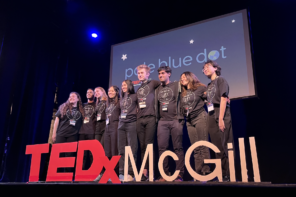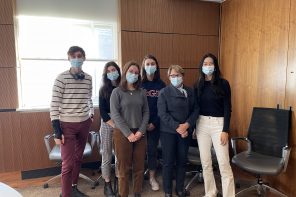On January 16, members of the student media sat down with Suzanne Fortier in her office for a Q&A alongside James Martin, Interim Director of Internal Communications; Christopher Buddle, Dean of Students; Louis Arseneault, VP Communications and External Relations; and Fabrice Labeau, Interim Deputy Provost for Student Life and Learning.
Changing the Name:
Fortier emphasized the importance of having a “good, healthy debate” on the Redmen issue, and spoke of the variety of opinions that have been presented to her. “We’ve received hundreds and hundreds of thoughtful and respectful letters that have been sent to me by individuals [who want] to give me advice on this, and you might not be surprised to hear that they don’t have the same views… and it is important that now we listen to what people have to say.”
When B&B asked Principal Fortier about the potential for renaming McGill’s various oppressively named institutions (i.e. The Redmen), she replied that she intended to consult the Final Report by the Working Group on Principles of Commemoration and Renaming, and “use the advice given in the report to address some issues.” Christopher Buddle went on to say: “You’re absolutely right, there’s a series of conversations we need to have about a series of different names.”
Buddle commented on how the final report will be used to address issues of renaming in the future, stating: “I think something that’s really important is having a document like [the final report because] it produces a framework. Where we’ve seen [lack of success] at other institutions is when there’s the lack of a framework.”
He went on to clarify why McGill is often perceived to be inactive on hot-button issues, explaining: “McGill is slow, we know that, or people view McGill as slow. We are a slow, careful, thoughtful institution, and I think that when it comes to building a framework to discuss name change that’s really important.”
Transparency Within the Administration:
In response to a question about students’ perception that the administration is not always transparent, Principal Fortier outlined the necessity for mutual cooperation.
“La transparence est une double voix… le secrétariat dit aux gens: ‘Si vous avez des opinions, partagez, envoyez nous vos opinions,’ mais les gens [n’ont] pas partagé [leurs opinions], Alors, je pense que c’est un travail important qu’on doit faire .. pour notre communauté.”
“Transparency is a two-way street… the secretariat told people ‘If you have opinions, share, send them to us,’ but people did not send any. And, I think this is very important work we must do… for our community.”
Principal Fortier emphasized the importance of hearing all sides of the story. “Even if I know that I’ll be criticized because some people say that [hearing all sides] is too slow, [I know that] it is slow, but it would be disrespectful for me not to make the effort to hear all the voices.” Asserting that it’s not always easy, Fortier claimed: “I can be a punching bag at times, but that’s part of the role.”
I can be a punching bag at times, but that’s part of the role.
When asked what steps the administration is taking to make students feel safer on campus, Fortier replied: “the question is a complex one, and many times, people who have either had an experience that was very difficult or know somebody who has had an experience that was very difficult, will request immediate action without thinking that [what] might be good for this particular situation [might not be] for the broader community. We take immediate action when there’s something that is obvious, but on things that affect the whole community where the solution requires really to think about the whole community, we have to do the proper work of consultation and thinking deeply.”
Implementing the Task Force’s Recommendations:
On the publishing of the Task Force on Respect and Inclusion in Campus Life’s Final Report, Principal Fortier detailed how McGill is responding to the recommendations made. “We’ve made it a priority,” she said, “money is in the budget specifically to respond to the work of the task force.”
She explained that the school made a commitment to increasing the number of indigenous professors, and outlined the Faculty of Education’s new Bachelor of Education First Nations and Inuit Education Program (FNIE) which will be given in Kahnawàke.
Fortier emphasized the impact of the slogan “Nothing About Us Without Us” which she said has been a key phrase as McGill works alongside indigenous communities. “It’s not so long ago that people were trying to find solutions for some of the issues faced by Aboriginal communities without properly involving the people in the Aboriginal communities. I think that’s something here that’s a guiding light, and we are working with aboriginal communities in these efforts.”
Mr. Labeau listed a number of projects McGill is undertaking including collaborating with Indspire to give new scholarships to indigenous students, increasing scholarship money from donors, hosting the conference for the Canadian Indigenous Advisory Council (CAIC) of ASIES, and considering indigenous students’ experiences in both coming to McGill, and being at McGill.
Responding to Sexual Violence Policy Needs:
In response to media reports that McGill did not meet the province’s January 1st deadline to adopt a policy on sexual violence, Principal Fortier replied that McGill has had a policy since 2016. “We did not miss the deadline in terms of the big policy, [only] in adjusting the few parts that are not completely aligned,” stated Fortier.
Buddle went on to add that the policy revision will be going to the Senate for information in February, and for adoption hopefully in March to reflect the changes required by Bill 151.
On the Guidelines on Intimate Relationships Between Teaching Staff and Students, Fortier said: “We have to ask ourselves what level of authority we should have over people’s private life. Is it for me to say that a student who is a TA in engineering cannot have a relationship that is intimate with a person who is an undergraduate student in the humanities? This is the kind of question I have to ask myself, so it’s not a simple answer.”
We have to ask ourselves what level of authority we should have over people’s private life.
Interactions with the New CAQ Government:
B&B inquired about how the administration has found interacting with the newly elected CAQ government. Principle Fortier replied: “the one good thing that I’ve heard and very important is that education is the number one priority.”
She addressed Premier Legault’s comments on visible religious symbols in educational institutions, saying: “He mentioned [restrictions on visible religious symbols in] primary and secondary schools, [but] did not mention universities or colleges, so we think we’re not going to be not included there at the moment… We have a very strong commitment to not only being inclusive but being welcoming of the diversity of people at McGill, so we want to make sure that this is not something that will be in jeopardy in any way.”
Restructuring the SEDE Office:
Mr. Labeau described the overarching goals of the Social Equity and Diversity Education (SEDE) office’s restructuring, which started a few months ago. He stated: “Basically, what we’re trying to do through this is take the different functions and put them in locations where they’re going to be strengthened and have more support.”
He explained that outreach and community services have moved to Enrollment services, other activities will be moving to Student Services, or integrated into the new Rossy Student Wellness Hub.
Campus Accessibility and Winter Safety:
When asked about winter safety on campus, Fabrice Labeau acknowledged the reality of campus’ inaccessibility. He commented: “We realize that we have some issues with accessibility and universal access on this campus … due to the age of our buildings, it’s worse than in many places.”
Campus will be made increasingly accessible, however, due to “increased funding for universal access projects,” which Labeau says “should ease the access to some of our buildings that are notably difficult to access for people who have different mobility.”
“It’s not going to be perfect,” he says, “there’s a huge list… of the projects that need to be done, but we’re going to be able this year to go deeper down this list than we usually can.”
There’s a huge list… of the projects that need to be done, but we’re going to be able this year to go deeper down this list than we usually can.
Anti-Violence Fee Levy to Remain in Place:
The Judicial Board unanimously ruled that the Anti-Violence Fee Levy was adopted in full respect of the applicable constitutional requirements. The decision was ratified by the Board of Directors on December 14.
In December, Arts & Science Senator Bryan Buraga, the petitioner, filed the action against respondents Tre Mansdoerfer, SSMU President, and Jun Wang, Vice-President Finance. The action challenged the constitutionality of the Anti-Violence Fee Levy (AVFL), an opt-outable student fee that was approved by the student body in the Fall 2018 referendum.
Buraga alleged that the AVFL violates the SSMU Constitution because it failed to meet procedural requirements. Buraga also claims that in pursuing the AVFL, Mansdoerfer and Wang breached the “standard of care” required of them in their capacities as SSMU executives. Buraga hoped to have the AVFL struck down as unconstitutional and the vote declared invalid.
The Gendered and Sexual Violence Policy (GSVP) was passed in the October 11th Legislative Council session, but the funding for the Policy was not included in SSMU’s budget. The AVFL’s purpose is to fund the GSVP, but since the fee was not levied until this semester, the full range of GSVP services was not accessible to survivors in the Fall 2018 semester. Buraga alleged that if Wang and the Executive Committee had prioritized the GSVP, the adjudicative measures could have been implemented immediately. He stated, “Four months is four months too long for survivors to have to wait in order to feel safe on campus.”
Four months is four months too long for survivors to have to wait in order to feel safe on campus
After hearing the facts of the case, the Judicial Board decided that the AVFL was submitted “in full respect of the applicable procedural timeline for Fee Questions to be voted on,” and that the motion had the requisite number of movers as per the SSMU’s Internal Regulations of Governance and the Standing Rules. Furthermore, the Board ruled that no standard of care had been breached by Mansdoerfer nor Wang, and that the Executive Committee as a whole is not bound by the standard of care established in 16.1 of the SSMU Constitution; only individual members are subject to the standard.
On the decision, Buraga told The Bull & Bear: “While the Judicial Board judgment did not go the way I had hoped, I am glad that my case started a conversation about SSMU’s role in protecting survivors of sexual violence. I will continue to fight for permanent funding for the GSVP and look forward to working with the SSMU President and VP Finance to do so.”
Schulich Library to Close for Major Renovations:
Beginning this summer, Schulich Library will be closed for a two-year period in order to undergo major structural repairs and internal renovations. The building requires “stabilization of the stone structure, foundation waterproofing, window replacement, washroom expansion and the installation of a new heating, ventilation and air conditioning system (HVAC).”
After renovations have been completed, Schulich is set to feature: more study and workspaces, improved accessibility, restored exterior masonry, a new HVAC system, new flooring, ceilings, and lights, and an expanded number of washrooms, including gender-neutral options.
Construction will take place from Summer 2019 to the end of 2021. In the meantime, approximately 675 of Schulich’s student study desks and a large portion of Schulich’s print and reserve collection will be moved to the McLennan-Redpath Library Complex. Staff will also be relocated to McLennan in the Humanities and Social Sciences Library.








